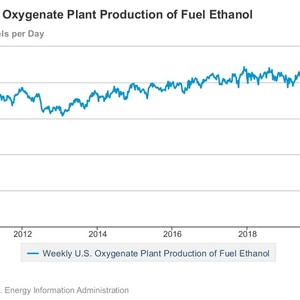EIA: Ethanol production down 1%, stocks down slightly

January 27, 2021
BY Erin Krueger
U.S. ethanol production fell by more than 1 percent the week ending Jan. 22, according to data released by the U.S. Energy Information Administration on Jan. 27. Stocks of fuel ethanol were down slightly.
U.S. ethanol production averaged 933,000 barrels per day the week ending Jan. 22, down 12,000 barrels per day when compared to the 945,000 barrels per day produced during the previous week. When compared to the same week of last year, production was down 96,000 barrels per day.
Advertisement
Advertisement
Production of fuel ethanol has stabilized in recent months after falling to historic lows in the spring of 2020 due to market impacts caused by the COVID-19 pandemic. Ethanol production hit a low of 537,000 barrels per day the week ending April 24, but began to recover in May and June as travel restrictions associated with the pandemic began to ease and demand for transportation fuels started to recover. Production levels since July have been maintained at a level above 900,000 barrels per day, but are down roughly 10 percent when compared to the same period of last year.
Weekly ending stocks of fuel ethanol fell to 23.602 million barrels the week ending Jan. 22, down 26,000 barrels when compared to the 23.628 million barrels of stocks reported for the previous week.
Advertisement
Advertisement
Stocks of fuel ethanol trended down for several months after reaching a record high of 27.289 million barrels the week ending April 17 and remained at levels below those reported for the same period of 2019 through mid-November. Ending stocks, however, trended higher through mid-January. When compared to the same week of last year, ethanol stocks for the week ending Jan. 22 were down 642,000 barrels.
Related Stories
U.S. fuel ethanol capacity fell slightly in April, while biodiesel and renewable diesel capacity held steady, according to data released by the U.S. EIA on June 30. Feedstock consumption was down when compared to the previous month.
XCF Global Inc. on July 8 provided a production update on its flagship New Rise Reno facility, underscoring that the plant has successfully produced SAF, renewable diesel, and renewable naphtha during its initial ramp-up.
FutureFuel idles biodiesel production amidst regulatory uncertainty, shifts full focus to specialty chemicals growth
FutureFuel Corp. on June 17 announced it will temporarily idle its biodiesel facility upon completion of its remaining contractual obligations, anticipated to occur by the end of June. The company is shifting its focus to specialty chemicals.
The U.S. EPA on June 18 announced 1.75 billion RINs were generated under the RFS in May, down from 2.07 billion that were generated during the same period of last year. Total RIN generation for the first five months of 2025 reached 9.06 billion.
TotalEnergies has announced the company expects its facilities will be able to produce more than half a million tons of SAF a year by 2028 to cover the increase in the European SAF blending mandate, set at 6% for 2030.
Upcoming Events










